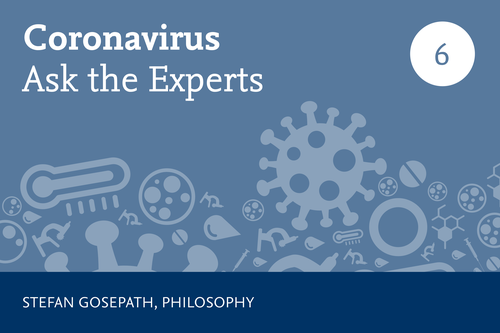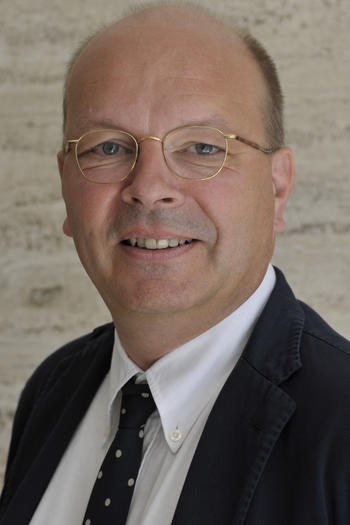How Just is Our Society in Times of Crisis?
campus.leben series: “Coronavirus – Ask the Experts” / Part 6: Interview with Stefan Gosepath, a professor of practical philosophy at Freie Universität
Apr 28, 2020
“Individual freedom hits a limit when it begins to violate the freedom of others.” Philosophy professor Stefan Gosepath from Freie Universität Berlin on justice, morality, and decision-making processes during the coronavirus crisis.
Image Credit: shutterstock.com/khaleddesigner
What changes has the coronavirus pandemic brought about? How has it influenced the lives of individuals? What impact is it having on society, politics, the economy, research, and culture? Researchers at Freie Universität Berlin provide insights on the current situation from their professional perspectives in the campus.leben series “Coronavirus – Ask the Experts”: In this interview, Dennis Yücel speaks with Stefan Gosepath, a professor of practical philosophy at Freie Universität, about restricting freedom, triage decisions, and the question of justice during a pandemic.
Professor Gosepath, public debate is currently focused on the question of whether, and how long, the decisions to limit certain freedoms are in line with the basic principles of liberal democracy. As a philosopher, what is your opinion?
Professor Stephan Gosepath works in the field of moral philosophy and ethics. He focuses on theories of responsibility, practical thinking, and decision making.
Image Credit: Bernd Wannenmacher
The question as to how long our constitution can withstand these restrictions on freedom is no small matter. It is a stress test for constitutional governments. Nevertheless, our society necessitates restrictions on freedom. Individual freedom hits a limit when it begins to violate the freedom of others. If the way I choose to exercise my freedom poses a threat to the health of others because I might infect them with a virus, then I have to limit my freedom – or the government has to limit it for me.
Democracy promises us that everyone is equally free. That also means that I should be able to live my life as safely as possible, free from danger, with as little risk of infection as possible. However, if in order to ensure that freedom from danger another person’s freedom has to be curtailed to such an extent that it is practically non-existent, then we find ourselves in a difficult balancing act. As is often the case, it is a matter of finding the right balance. Both government and society at large have to agree upon a balanced relationship between freedom and safety.
In Italy there are not enough ventilators for all of the patients with COVID-19. Doctors are forced to decide who receives treatment and who does not. Germany could also see a triage situation like this if the number of new infections continues to rise. How does one make a decision when faced with such a horrific question?
That is an ethical dilemma that the people of the Federal Republic of Germany have not encountered in this intensity before. It is a situation that we usually only see in times of war.
It is important to keep in mind that it is not simply a medical decision, but an ethical one. Which is why it important to have a transparent public debate about these questions: What rules do we as a society want to put in place in order to decide who receives a ventilator? Do we want to save as many individual lives as possible? Or do we want to save as many years of human life as possible? Should we base the decision on who has the better chance of surviving – or who still has a “good” life ahead of them? We could leave it up to chance with a lottery. Or just whoever was at the hospital first.
If the health-care system does get overburdened, Germany’s professional medical associations recommend that the deciding factor should be who has the best chances of surviving
How can philosophy help when it comes to making a decision?
It is helpful to think about which moral principle you want to guide the decision. Today, there are two main schools of philosophical thought that provide guidance. On the one hand, there is the utilitarian line of thinking, which is common in Anglo-Saxon countries. On the other hand, you have deontological reasoning, which was greatly influenced by Immanuel Kant, and is quite common in Germany. In Italy, where they are triaging based on the maximum number of years they can save, we can see utilitarian decision-making at work.
Can you tell us more about the utilitarian line of thinking?
It is based on maximizing utility. The argument goes that it is more useful to give a younger person a ventilator because an older person, one assumes, does not have as long to live and thus has less potential to be productive for society.
So, the decision is not just about what is most useful for an individual, but rather how useful an individual is for society?
Yes, the principle is the greatest happiness of the greatest number of people. Here’s another example that is perhaps a bit easier to relate to: If a hospital worker falls ill and needs a ventilator, they are given priority because if we are losing doctors and nurses, the entire health-care system is jeopardized. The life of a doctor appears to be more useful than, for example, the life of a gardener.
However, one should carefully consider whether a person’s usefulness as the basis for such triage decisions is something we want to support as a society – or whether it might be better to pursue a more egalitarian solution.
What would the deontological approach look like in this case?
The deontological principle says: everyone has the same rights because human dignity is universal. Every individual is equally valuable. Accordingly, the protection of human dignity guaranteed by the German Basic Law prohibits weighing one human life against another. The state is not allowed to make decisions that tip the scales. This basic principle, however, does not make it any easier to prioritize medical resources when we are forced to do so.
Deontological ethical reasoning would begin with a thought experiment like this: You would ask yourself what sort of rule would you approve of if you yourself did not know what role you were playing in the distribution system? In other words, if you did not know whether you were a “useful” person or not, whether you are old or not, or have good chances of survival or not. The goal is to develop a neutral decision-making process that does not put one group of individuals at an advantage over others.
As a moral philosopher how do you see the current situation and what do you foresee in the future?
I think that as the pandemic progresses, it will become increasingly apparent how just, or unjust, the central institutions of a state are, from its political system to its welfare-state systems, to its health-care system and economic system.
In a country like Germany, for example, with a health-care system that functions quite decently, people from all income levels will be affected by the disease more or less equally. By contrast, in the USA, where there is practically no public health-care system, little protection for employees, and retirement plans are almost exclusively privatized, we can expect to see the disease affect socially vulnerable groups much more.
Therefore, a naturally occurring disease can have very different outcomes in different countries. All of us, but most importantly our political representatives, must bear the moral and political burden for the different outcomes. The consequences depend, on the one hand, on the measures taken to fight the pandemic and, on the other hand, on the political and social institutions in place, as can be seen when you compare Germany and the USA.
Far worse inequalities and higher death rates are to be feared when the disease reaches the poorest countries of the world, primarily those on the continent of Africa. The coronavirus pandemic will intensify the injustices inherent in national and international distribution systems and exacerbate them to an almost unbearable level. In the aftermath of the crisis, we will need to talk about how to finally make these political, social, and economic systems more just worldwide in order to guarantee that everyone has at least some minimal protection of their lives in terms of human rights.
The original German version of this article was published on April 14, 2020, in campus.leben, the online magazine of Freie Universität Berlin.
Further Information
Read all the interviews in the campus.leben series “Coronavirus – Ask the Experts”:
- Interview with Claudia Müller-Birn: “How should we design the tracing app so that people want to use it?”
- Interview with Tanja Börzel: “The European Union has proven its resilience in times of crisis”
- Interview with Professor Eun-Jeung Lee: “Many countries are now trying to learn from the Korean experience”
- Interview with Professor Joachim Trebbe: “We are communicating more than usual in bubbles”
- Interview with Carolin Auschra: “Organizations and systems often change in times of great crisis”
- Interview with Professor Hansjörg Dilger: “The coronavirus pandemic is a mirror of globalization and the inequalities it has produced”
- Interview with Lars Gerhold and Roman Peperhove: “Everyone is potentially affected, but everyone can also do something”
- Interview with Paul Nolte: “We are going to be working through this trauma for decades to come”
- Interview with Martin Voss: “If we choose to, we can lay the groundwork to shape the future”


